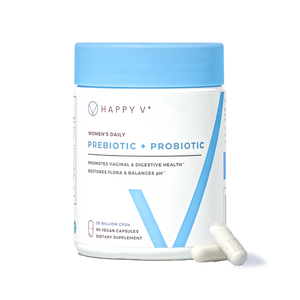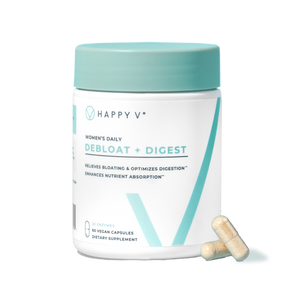- Fact Checked
- September 25, 2025
- 11 min read
How Long Does Menopause Last? Symptoms, Stages, and Relief Tips
Table of Contents
Table of Contents
Menopause represents one of the most significant transitions in a woman's life1. It’s not just the end of menstruation but a complex biological process that affects every aspect of health and well-being.
While this journey can feel overwhelming, understanding what to expect and how to navigate each phase can empower you to take control of your experience and maintain your quality of life throughout the transition.
This post is for informational purposes only and does not constitute medical advice. See full disclaimer below.
The 3 Stages of Menopause
Menopause is not a single event but a gradual process unfolding over several years through three distinct phases. This process can be divided into 3 key stages: perimenopause, menopause, and post menopause.
Perimenopause
Perimenopause typically begins in a woman's 40s, though it can start as early as the mid-30s.
This phase is characterized by significant hormonal changes as the ovaries gradually produce less estrogen and progesterone. The menopausal transition can last anywhere from a few months to over a decade, with an average duration of 4-8 years.
During perimenopause, women often experience their first menopause symptoms, including irregular periods that may be shorter, longer, heavier, or lighter than usual2. Ovulation becomes unpredictable, making conception more difficult but still possible.
Menopause
A woman has reached menopause when they have had 12 consecutive months without a period.
Menopause marks the end of the reproductive years and the completion of the menopausal transition. The average age of menopause in developed countries is 51, though normal timing ranges from 45-55 years old.
Postmenopause
Postmenopause encompasses all the years following menopause. So essentially, it’s the rest of your life after menopause!
During this phase, hormone levels stabilize at consistently lower levels. While many symptoms may improve or resolve, some effects of lower estrogen levels, such as bone density loss and cardiovascular changes, continue and may require ongoing attention.
Duration of Menopause and Its Symptoms
Menopausal symptoms typically last 4-10 years on average, though some women experience symptoms for shorter or longer periods.
Vasomotor symptoms, which include hot flashes and night sweats, are often the most persistent symptoms, potentially continuing for up to a decade after the final menstrual period, though they are often not as intense as during perimenopause. In fact, research indicates that these symptoms peak during perimenopause and the first few years of postmenopause before gradually decreasing in frequency and intensity.
Using a menopause symptom tracker can be invaluable for identifying patterns and triggers.
Modern tracking methods include smartphone apps, journals, or simple calendars where women can note symptom frequency, severity, and potential triggers. This information helps healthcare providers develop personalized treatment plans and allows women to identify lifestyle modifications that may reduce symptom severity.
Common Symptoms of Menopause
Menopausal symptoms happen as hormone levels, and especially estrogen, decline. Because estrogen influences so many body systems3, the effects can show up in different ways. Not every woman experiences every symptom, but knowing the possibilities makes it easier to recognize changes and get the right support.
Hot Flashes & Night Sweats
Hot flashes are the most recognized symptom, affecting up to 75% of women4. They often start in the chest and move upward, bringing heat, sweating, a racing heartbeat, or even a wave of anxiety.
When they happen at night, they’re called night sweats. These can be strong enough to soak sleepwear and bedding, often leading to poor sleep, daytime fatigue, mood swings, and brain fog.
Irregular Periods
Cycles may become shorter, longer, heavier, or lighter. Some women experience flooding, while others notice spotting or skipped periods. The unpredictability can be stressful and may require adjusting routines.
Mood Swings & Emotional Changes
Menopause can bring stronger mood changes than typical PMS. Irritability, sadness, or sudden bursts of anxiety may appear without warning. These shifts are linked to hormones interacting with brain chemicals like serotonin and GABA5.
Memory Problems (“Brain Fog”)
Difficulty concentrating, forgetting words, or feeling mentally “off” is common. While frustrating—especially at work or in daily tasks—these symptoms usually improve after hormones settle in postmenopause.
Sleep Disturbances
Beyond night sweats, many women struggle with falling asleep, staying asleep, or waking up too early. Lower estrogen also affects sleep quality by reducing deep and REM sleep.
Changes in Sexual Health
Lower testosterone and estrogen can reduce libido, arousal, and satisfaction6. Vaginal dryness may also develop as tissues thin and natural lubrication decreases, sometimes leading to discomfort during sex or a greater risk of infections.
Urinary Symptoms
Declining estrogen also affects the bladder and urethra, leading to urinary urgency, frequency, or nighttime trips to the bathroom7. Some women also notice occasional leakage.
Physical Aches & Changes
Women experiencing perimenopause and menopause often report:
- Joint pain and stiffness: Especially in hands, knees, hips, and spine.
- Headaches8: May worsen due to hormonal fluctuations.
- Weight gain9: More likely to accumulate around the abdomen, even without changes in eating habits.
Factors Affecting Menopause Duration and Symptoms
Menopause doesn’t look the same for everyone. Several factors shape when it begins, how long it lasts, and how intense the symptoms feel.
Age at Onset
The age when menopause begins makes a big difference:
- Early menopause (before 45): Symptoms often last longer and are more severe.
- Later menopause: Symptoms may be shorter and less intense.
Genetics and Family History
Family patterns are one of the strongest predictors. If your mother or close relatives experienced early menopause, you may follow a similar timeline. Genetics can also affect how severe symptoms are, with some families more prone to difficult transitions.
Lifestyle Habits
Everyday choices can shape your menopause experience:
- Diet: Foods rich in phytoestrogens (soy, flaxseeds, legumes) may help ease hot flashes10.
- Alcohol: Often worsens hot flashes, mood swings, and sleep problems.
- Smoking: Accelerates menopause by 1–2 years on average.
- Sleep patterns: Poor sleep habits can magnify symptoms and reduce overall well-being.
Medical History
Certain health factors can trigger earlier or more intense menopause:
- Surgeries like hysterectomy or oophorectomy
- Chemotherapy or radiation
- Autoimmune diseases or other chronic conditions
Race and Ethnicity
Research shows meaningful differences among women from different backgrounds:
- African American women: Tend to experience vasomotor symptoms (like hot flashes) for a longer duration.
- Asian women: Often report shorter periods of hot flashes.
These variations likely reflect a mix of genetics, cultural practices, diet, and access to healthcare.
Premature and Early Menopause
While most women reach menopause between 45 and 55, some experience it earlier. Premature menopause is that which occurs before age 40, while early menopause occurs before age 45. They affect 1% and 5% of women, respectively.
Causes and Risk Factors
Several factors can trigger premature or early menopause, including:
- Genetics and family history increase risk.
- Autoimmune diseases may cause the immune system to attack ovarian tissue, leading to ovarian failure.
- Chemotherapy and radiation therapy can damage ovarian function.
- Surgical procedures, such as hysterectomy or oophorectomy, cause immediate menopause.
- Smoking raises the likelihood of experiencing menopause earlier.
For most women with premature or early menopause, hormone therapy is recommended until at least the typical age of menopause to help prevent long-term health consequences (which we get into next!).
Impact of Menopause on Overall Health
Menopause isn’t just about managing temporary symptoms (though we’ll get into how to do that next!). The changes in hormones can have an impact on overall health. By knowing what these impacts are, you can take proactive steps to protect your bones, heart, metabolism, and emotional well-being, not just during the transition, but for the years that follow.
Bone Health
Estrogen plays a key role in maintaining bone density by balancing bone formation and breakdown. As estrogen declines, bone loss accelerates. Women can lose 1–3% of bone density each year during the first few years after menopause, raising the risk of osteoporosis and fractures.
Cardiovascular Health
Estrogen also protects the heart by keeping cholesterol levels healthy, supporting flexible blood vessels, and reducing inflammation. After menopause, the risk of cardiovascular disease rises significantly11. Cholesterol often shifts as well, with higher total cholesterol, LDL (“bad” cholesterol), and triglycerides.
Body Composition & Metabolism
Menopause often brings changes in body shape and metabolism12. Many women notice:
- More abdominal fat
- Reduced muscle mass
- A slower metabolic rate
These shifts can lead to weight gain, even without major changes in diet or exercise.
Emotional and Mental Health
The physical symptoms of menopause often overlap with big life transitions in midlife. Women may feel grief over the loss of fertility, face relationship or career shifts, or worry about aging. Emotional stress is common, and women with a history of depression or anxiety may be especially vulnerable.
Management and Treatment Options
When it comes to effectively managing menopause symptoms and supporting long-term well-being, the right combination of strategies can make a real difference.
Lifestyle Changes
Lifestyle habits form the foundation of symptom management:
- Diet: Focus on calcium, vitamin D, and phytoestrogen-rich foods (like soy and flaxseed) to support bones and ease hot flashes.
- Exercise: Weight-bearing activities help maintain bone density, while cardiovascular exercise supports heart health, boosts mood, and can even reduce hot flash severity.
- Sleep & Stress Management: Good sleep hygiene and stress reduction techniques improve quality of life.
Hormone Therapy
Hormone therapy is still the most effective treatment for moderate to severe symptoms:
- Estrogen therapy: For women who’ve had a hysterectomy.
-
Estrogen-progestogen therapy: For women with a uterus, to protect the uterine lining.
Guidelines recommend using the lowest effective dose for the shortest time necessary.
Nonhormonal Treatments
For women who cannot or prefer not to use hormone therapy, options include:
- Cognitive Behavioral Therapy (CBT): Helps reduce hot flash impact and improve coping.
- Black cohosh: An herbal option studied for hot flashes and mood.
- Gabapentin or antidepressants: Can reduce hot flash frequency and severity.
- Lubricants and moisturizers: Relieve vaginal dryness and discomfort.
Natural Support
Supplements can provide extra relief alongside lifestyle and medical strategies, especially for hot flashes, sleep issues, mood shifts, and bone health.
Key supportive ingredients often include:
- Vitamin B6 & B12 for energy, mood regulation, and nervous system health13
- DIM (Diindolylmethane) to promote healthy estrogen metabolism14
- Hop extract and red clover, plant-based compounds studied for reducing hot flashes15
- Ashwagandha, an adaptogen that helps the body handle stress and maintain balanced energy16
- Magnesium and zinc for relaxation, immune function, and sleep quality
- 5-HTP to support restful sleep and mood balance
- Lignans from Norway spruce, a natural phytoestrogen that may gently support hormone balance17
Happy V Menopause Relief AM + PM brings these targeted ingredients together in a unique dual-formula system. The AM formula is designed to boost daytime vitality, supporting steady energy, mood balance, and focus, while the PM formula eases nighttime symptoms, helps calm stress, reduces night sweats, and supports deeper, more restorative sleep.
This around-the-clock approach smooths the most common challenges of menopause and post-hysterectomy transitions, offering your body the support it needs, exactly when it needs it.
Communication and Support
Sometimes, symptom relief doesn’t come in the form of a supplement or medical treatment. Sometimes, it’s about strong communication and support systems, like:
- Professional support: Working with knowledgeable healthcare providers is essential. Menopause Society-certified practitioners have specialized training, and the North American Menopause Society directory can help you find one nearby.
- Talking with your doctor: Tracking symptoms in a diary or app provides valuable information for creating an effective treatment plan. Regular visits allow for monitoring, adjustments, and preventive screenings, such as bone density and heart health checks.
- Family and intimacy: Menopause can bring changes in sexual health and emotional wellbeing. Honest conversations about intimacy, mood, and physical changes help partners and family members understand and adapt.
- Emotional and community support: Joining support groups or seeking counseling can reduce isolation and provide tools for managing mood shifts, relationship challenges, and identity changes during this stage of life.
Final Thoughts
Menopause can last anywhere from a few years to over a decade, depending on your body, genetics, and lifestyle. The symptoms are real and varied, but with the right support, lifestyle choices, and symptom management, you can move through this stage with more comfort, confidence, and balance.
Remember that menopause doesn't have to be something you simply endure, but rather an opportunity to take charge of your health and embrace this new phase of life with knowledge and confidence.
Keep the Conversation Going
-
Visit our blog for more women’s health tips.
-
Join our private Happy V Facebook group to hear from others who’ve been there.
- Explore supplements designed to support your vaginal health journey.
Disclaimer: This blog is for informational and educational purposes only and is not intended to diagnose, treat, cure, or prevent any disease. Statements about supplements have not been evaluated by the Food and Drug Administration. For more information about vaginal infections, visit the CDC or speak to a licensed healthcare provider.












